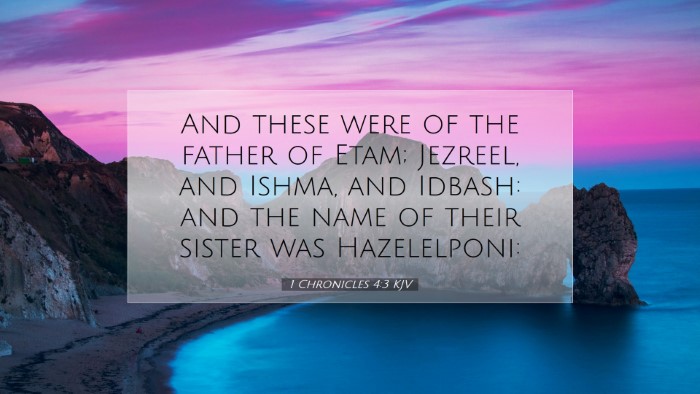Commentary on 1 Chronicles 4:3
Verse Context: 1 Chronicles 4:3 states, “And these were of the father of Etam: Jezreel, and Ishma, and Idbash, and the name of their sister was Hazelelponi.” This verse is part of a genealogical record and introduces names that later may seem obscure, yet they bear significance in the ancestry of important figures in Israel's history.
Introduction to Genealogies
Genealogies in Scripture serve several purposes, reflecting both historical records and theological truths. The chronicler's intent in listing these names emphasizes the importance of heritage and divine promise fulfilled through generations.
Insights from Commentators
-
Matthew Henry's Commentary
Matthew Henry emphasizes the value of understanding our spiritual lineage. Although the current verse mentions relatively unknown individuals, Henry interprets their inclusion as a reminder that all names and lives matter in God's narrative. Each name contributes to the unfolding story of redemption. He points out the significance of names in the Biblical text, suggesting that they often come with inherent meaning and destiny.
-
Albert Barnes' Notes on the Whole Bible
Barnes highlights this verse as part of a broader list meant to denote the tribes' organization and tribal leaders. He suggests that the chronicler records these names not only to document heritage but also to assert the tribe’s enduring legacy and connection to God’s promises. This historical grounding reassures the people that their identity and purpose are rooted in God's continual guidance through their lineage.
-
Adam Clarke's Commentary
Adam Clarke focuses on the names listed, interpreting them individually to extract potential meanings. He notes that Jezreel, for instance, has associations with God’s sowing, projecting a positive idea of prosperity and divine favor. Clarke underscores that even obscure genealogical names contain rich meanings that can yield insights into God's plans and blessings for His people. He underscores God's providence as evident in preserving these genealogical records, affirming His covenant with Israel.
Theological Reflections
Identity in Christ: Just as the names in 1 Chronicles signify a cohesive heritage, believers today find their identity in Christ. This connection illustrates how each believer, regardless of their background or obscurity, contributes to the greater narrative of salvation.
God's Sovereignty: The genealogical records reveal God's sovereignty throughout history. He orchestrates events and establishes individuals within the context of His divine plan. As seen in the names from the tribe of Judah, this sovereignty extends through generations, ultimately leading to Christ, the promise fulfilled.
Practical Applications
- Recognizing our Legacy: Just as the chronicler recorded the ancestors, Christians are called to reflect on their spiritual heritage. Understanding the past enriches faith and encourages believers to uphold the legacy of faith.
- Value of Every Believer: The mention of less-known names teaches us not to overlook those who appear insignificant within the church community. Each believer contributes to the body of Christ in meaningful ways.
- Encouragement in Trials: When facing trials, recalling God's faithfulness through history, as depicted in genealogies, can strengthen believers' resolve and remind them of God's unchanging character.
Conclusion
1 Chronicles 4:3 thrives within the context of a larger narrative that celebrates heritage, underscores God’s covenant, and reflects theological truths that resonate today. Through the insights of commentators like Matthew Henry, Albert Barnes, and Adam Clarke, we see how seemingly obscure genealogical records illuminate the grand narrative of God's redemptive work in history.


